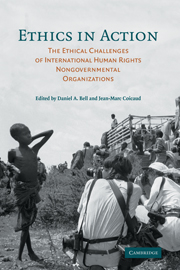Book contents
- Frontmatter
- Contents
- Acknowledgments
- List of Contributors
- Introduction: Reflections on Dialogues between Practitioners and Theorists of Human Rights
- SECTION I NORTHERN INGOs AND SOUTHERN AID RECIPIENTS: THE CHALLENGE OF UNEQUAL POWER
- SECTION II INGOs AND GOVERNMENTS: THE CHALLENGE OF DEALING WITH STATES THAT RESTRICT THE ACTIVITIES OF INGOs
- SECTION III INGOs AND ECONOMIC RIGHTS: THE CHALLENGE OF DEALING WITH GLOBAL POVERTY
- Conclusion: INGOs as Collective Mobilization of Transnational Solidarity: Implications for Human Rights Work at the United Nations
- Index
Introduction: Reflections on Dialogues between Practitioners and Theorists of Human Rights
Published online by Cambridge University Press: 29 July 2009
- Frontmatter
- Contents
- Acknowledgments
- List of Contributors
- Introduction: Reflections on Dialogues between Practitioners and Theorists of Human Rights
- SECTION I NORTHERN INGOs AND SOUTHERN AID RECIPIENTS: THE CHALLENGE OF UNEQUAL POWER
- SECTION II INGOs AND GOVERNMENTS: THE CHALLENGE OF DEALING WITH STATES THAT RESTRICT THE ACTIVITIES OF INGOs
- SECTION III INGOs AND ECONOMIC RIGHTS: THE CHALLENGE OF DEALING WITH GLOBAL POVERTY
- Conclusion: INGOs as Collective Mobilization of Transnational Solidarity: Implications for Human Rights Work at the United Nations
- Index
Summary
International human rights and humanitarian nongovernmental organizations (INGOs) are major players on the world stage. They fund human rights projects, actively participate in human rights and humanitarian work, and criticize human rights violations in foreign lands. They work in cooperative networks with each other, with local NGOs, and with international organizations. They consult and lobby governments and international organizations, sometimes participating in high-level negotiations and diplomacy for global policy development. They cooperate and negotiate with economic and political organizations in the field for the implementation of their projects, whether this be monitoring or assistance. In short, they are generating a new type of political power, the purpose of which is to secure the vital interests of human beings on an international scale, regardless of state boundaries.
Needless to say, good intentions are not always sufficient to produce desirable results. In an imperfect and unpredictable world, human rights INGOs often face ethical dilemmas that constrain their efforts to do good in foreign lands. How do people who want to do good behave when they meet obstacles? Is it justifiable to sacrifice some good in the short term for more good in the long term? And which human rights concerns should have priority? Like other organizations, INGOs are constrained by scarce time and resources and must choose between competing goods. Human rights practitioners experience hard choices, compromises, and prioritizing as ongoing features of their moral world.
- Type
- Chapter
- Information
- Ethics in ActionThe Ethical Challenges of International Human Rights Nongovernmental Organizations, pp. 1 - 22Publisher: Cambridge University PressPrint publication year: 2006



